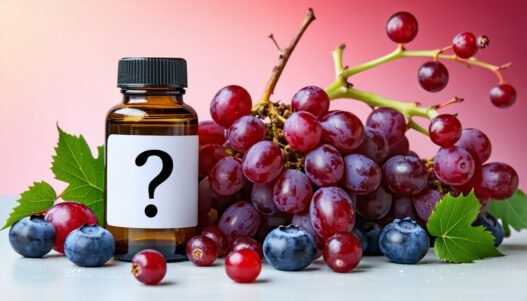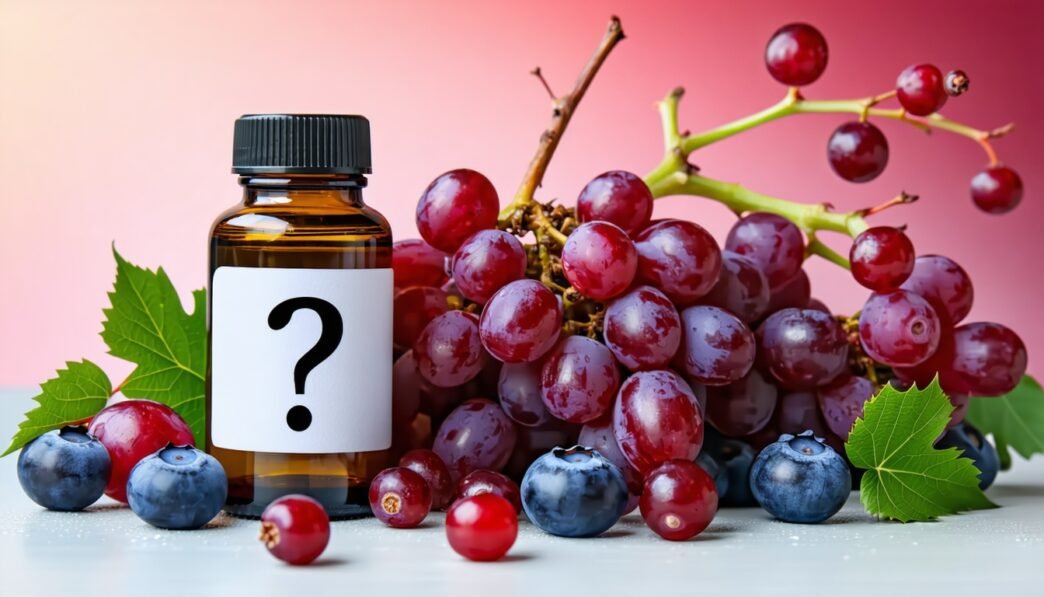Alternatives to Resveratrol
As health enthusiasts seek various options for anti-aging and overall wellness, alternatives to resveratrol are gaining attention. Among these, spirulina and curcumin stand out for their notable health benefits.
Spirulina Benefits
Spirulina is a type of blue-green algae known for its impressive nutrient profile. It helps reduce inflammation and strengthen the immune system. Research indicates that spirulina can significantly improve inflammatory markers and immune function, particularly in older adults (Healthline).
Spirulina provides a range of crucial nutrients, including proteins, vitamins, and minerals, contributing to its status as a superfood.
| Nutrient | Amount per 100g |
|---|---|
| Protein | 57g |
| Fat | 7g |
| Carbohydrates | 24g |
| Iron | 28.5mg |
| Calcium | 120mg |
Curcumin’s Anti-inflammatory Effects
Curcumin, the active compound found in turmeric, has garnered attention for its potent anti-inflammatory properties. It is known to decrease inflammation in various conditions, such as diabetes, heart disease, and cancer. Curcumin has also shown promise in improving symptoms of osteoarthritis and rheumatoid arthritis. Studies demonstrate that curcumin effectively reduces levels of inflammatory markers, positioned as a natural alternative to conventional anti-inflammatory medications.
| Condition | Effect of Curcumin |
|---|---|
| Osteoarthritis | Reduces pain and improves joint function |
| Rheumatoid Arthritis | Decreases inflammation and improves symptoms |
| Metabolic Syndrome | Lowers inflammatory markers |
These options present viable alternatives to resveratrol for those looking to enhance their health naturally. For more details on the benefits of resveratrol, visit what are the benefits of taking resveratrol?.
Omega-3 Fatty Acids
Omega-3 fatty acids are essential fats that the body cannot produce on its own. They play a significant role in various bodily functions and health benefits, particularly for those interested in exploring alternatives to resveratrol.
Health Benefits of Fish Oil
Fish oil supplements are a well-known source of omega-3 fatty acids, specifically EPA (eicosapentaenoic acid) and DHA (docosahexaenoic acid). These fatty acids are celebrated for their numerous health benefits, especially their ability to decrease inflammation associated with diabetes, heart disease, and other chronic conditions. DHA has been found to reduce cytokine levels, which are involved in inflammatory responses, thereby promoting overall gut health (Healthline).
| Benefit | Description |
|---|---|
| Decreased Inflammation | Reduces inflammation linked to various diseases. |
| Heart Health | Lowers triglyceride levels and can improve cardiovascular health. |
| Brain Function | Supports cognitive function and mental health. |
Anti-inflammatory Properties of Ginger
Ginger root, another powerful natural ingredient, contains compounds like gingerol and zingerone that contribute to its anti-inflammatory effects. It has been shown to help reduce inflammation related to conditions such as type 2 diabetes and breast cancer. Research indicates that ginger consumption can lead to improved blood sugar control and lowered inflammation levels in affected individuals (Healthline).
| Compound | Benefits |
|---|---|
| Gingerol | Exhibits strong anti-inflammatory effects. |
| Zingerone | Further enhances the anti-inflammatory properties of ginger. |
Incorporating fish oil and ginger into the diet may serve as effective alternatives to resveratrol while offering significant health benefits. For more insights on the advantages of resveratrol, check out our article on what are the benefits of taking resveratrol?.
Exploring Green Tea Extract
Green tea extract has garnered attention for its health benefits, particularly due to its rich content of epigallocatechin-3-gallate (EGCG). This powerful compound plays a significant role in inflammation control and acts as a potent antioxidant.
EGCG and Inflammation Control
Research shows that EGCG may significantly reduce inflammation, especially when combined with exercise. This compound helps modulate inflammatory processes, promoting overall health and wellness. Its efficacy as an anti-inflammatory agent makes green tea extract a favorable alternative for those seeking natural options to enhance their health.
| Benefit | Description |
|---|---|
| Anti-inflammatory | Reduces markers of inflammation in the body. |
| Supports recovery | Enhances post-exercise recovery due to lower inflammation. |
Antioxidant Role in Oxidative Damage
EGCG also acts as a powerful antioxidant, protecting cells from oxidative damage caused by free radicals. Antioxidants are crucial for maintaining cellular health and preventing chronic diseases. By scavenging free radicals, EGCG contributes to the body’s defense system, reducing the risk of oxidative stress-related conditions.
Furthermore, while resveratrol possesses potent antioxidant properties, its effectiveness is enhanced when integrated into formulations, such as nanoparticles that improve solubility and bioavailability. This feature allows for better absorption and prolonged action within the body, making it a complementary option alongside green tea extract.
| Antioxidant Feature | Effects |
|---|---|
| Radical scavenging | Neutralizes harmful free radicals. |
| Cell protection | Shields cells from oxidative stress and damage. |
In considering options related to resveratrol, both EGCG from green tea extract and additional antioxidants provide valuable benefits while supporting a holistic approach to health. For those exploring alternatives, these compounds promise significant advantages in the realm of natural health and wellness.
Noteworthy Supplements
Exploring alternatives to resveratrol includes considering various supplements that offer significant health benefits. Two noteworthy options are berberine and curcumin.
Berberine for Blood Sugar
Berberine is a powerful supplement known for its ability to effectively lower blood sugar levels and improve insulin sensitivity. Studies suggest that it can match the effects of the popular diabetes medication metformin. This supplement works by activating an enzyme called AMP-activated protein kinase (AMPK), which plays a crucial role in regulating metabolism and energy balance.
| Benefit | Effectiveness |
|---|---|
| Lowers blood sugar levels | Comparable to metformin |
| Improves insulin sensitivity | Significant improvement |
In addition to its blood sugar-lowering properties, berberine may also support cardiovascular health and assist in weight management, making it a comprehensive option for holistic wellness enthusiasts.
Curcumin Versus Anti-inflammatory Drugs
Curcumin, the active compound found in turmeric, has demonstrated powerful anti-inflammatory effects. Research indicates that curcumin can help fight inflammation, improve heart health, and potentially prevent cancer. Some studies even suggest that it may offer similar benefits to certain antidepressant medications.
| Benefit | Comparison to Anti-inflammatory Drugs |
|---|---|
| Anti-inflammatory effects | Similar benefits to some drugs |
| Heart health improvement | Comparable effects on heart function |
| Cancer prevention | Emerging research supports efficacy |
Curcumin’s versatility makes it a valuable addition to any health regimen, especially for individuals seeking natural alternatives to conventional medications. For more information on the benefits of resveratrol, including its interaction with other substances, visit our articles on what are the benefits of taking resveratrol? and does resveratrol increase estrogen?.
Beyond Resveratrol
In the quest for natural substances with health benefits, alternatives to resveratrol are gaining attention. Particularly noteworthy are pterostilbene and resveratrol nanoparticles, which offer enhanced functionalities compared to traditional resveratrol.
Pterostilbene’s Stronger Bioactivities
Pterostilbene (trans-3,5-dimethoxy-4’-hydroxystilbene) is a structural analog of resveratrol found primarily in blueberries. Research indicates that pterostilbene demonstrates higher biological activity and bioavailability than its counterpart, resveratrol. Its reported activities include:
- Anticancer
- Anti-proliferative
- Pro-apoptotic
- Antioxidant
- Anti-inflammatory
- Anti-invasive
- Antimetastatic
These attributes suggest pterostilbene could play a pivotal role in combating various diseases and health issues PMC.
| Benefit | Pterostilbene | Resveratrol |
|---|---|---|
| Anticancer | Yes | Yes |
| Anti-inflammatory | Yes | Yes |
| Bioavailability | Higher | Lower |
Resveratrol Nanoparticles and Antibacterial Activity
Resveratrol nanoparticles represent another innovative approach to enhancing the effects of resveratrol. By improving solubility, resveratrol nanoparticles can increase antioxidant potential and enhance bioavailability by over threefold compared to its raw form. This form also demonstrates improved absorption and duration of action PMC.
Furthermore, resveratrol exhibits antimicrobial properties against various pathogenic microorganisms, including Candida species and both Gram-positive and Gram-negative bacteria. The use of resveratrol nanoparticles can potentially bolster these effects, making it a suitable candidate for controlling foodborne pathogens and improving food safety NCBI.
| Formulation | Bioavailability Enhancement | Antimicrobial Activity |
|---|---|---|
| Resveratrol | 3.516 times more | Yes |
| Raw Resveratrol | Standard | Yes, but less effective |
Exploring these alternatives opens new avenues for natural health enthusiasts seeking to integrate effective compounds into their wellness routines. For more details on the benefits of resveratrol, visit our article on what are the benefits of taking resveratrol?.
Comparative Analysis
In examining alternatives to resveratrol, it is essential to consider how similar compounds operate within the body, particularly in relation to Notch signaling and anticancer effects.
Polyphenolic Compounds’ Notch Signaling
Polyphenolic compounds, such as resveratrol, play a significant role in regulating Notch signaling pathways. Notch signaling is crucial for various cellular processes, including differentiation, proliferation, and apoptosis. Research indicates that polyphenols can influence this pathway, potentially leading to enhanced cell survival and reduced risk of cancer.
These compounds can modulate cell signaling mechanisms, which is critical for maintaining cellular health. Through their interaction with Notch signaling, polyphenols might offer protective effects, reducing the risk of diseases associated with dysregulated cell growth, such as cancer. The understanding of how these compounds correlate with Notch signaling remains an ongoing area of exploration.
Resveratrol and Anticancer Effects
Resveratrol has garnered attention for its promising anticancer properties. Studies indicate that resveratrol can inhibit cancer cell growth, affecting multiple aspects of tumor development including cell signaling, angiogenesis, and promoting apoptosis of cancer cells. It has also been suggested that resveratrol may enhance the efficacy of chemotherapy by blocking chemotherapy-resistant proteins (WebMD).
Furthermore, new research has highlighted the potential of compounds like DMU-212, a derivative of resveratrol. This compound displayed stronger inhibitory activity against the proliferation of melanoma cancer cells in vitro compared to resveratrol. It is essential for health enthusiasts to consider these alternatives as they offer enhanced pharmacy and pharmacokinetic properties, indicating that research is continually evolving (PMC).
| Compound | Mechanism of Action | Cancer Type |
|---|---|---|
| Resveratrol | Inhibits cancer cell growth, promotes apoptosis | Various |
| DMU-212 | Stronger inhibitory effects on melanoma cell proliferation | Melanoma |
Natural health seekers should be aware of these advanced alternatives while exploring options in anti-aging and cancer prevention. Resveratrol continues to be impactful, but compounds like DMU-212 may offer pathways with stronger effects. For those interested in the benefits of resveratrol itself, more insights can be found at our article on what are the benefits of taking resveratrol?.





















